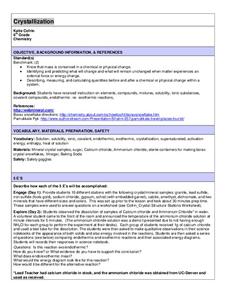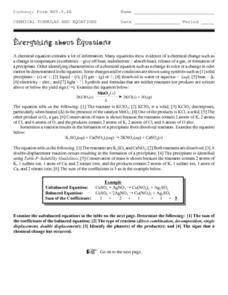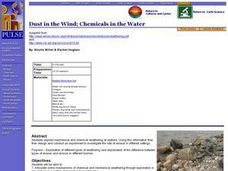Curated OER
How Does a Liquid Become a Solid?
Students explore the energy changes from a liquid to a solid. They model the arrangement of a solid and the change in states due to changes in energy using desks and chairs. Assessment questions are provided in lesson plan.
Curated OER
Water Vapor Equilibrium
In this chemistry worksheet, students complete 12 short answer questions and problems on water vapor equilibrium. They calculate equilibrium concentrations of reactants and products.
Curated OER
Introduction to AP Chemistry
Students are introduced to concepts in an AP Chemistry class. They work together to complete experiments on different materials. They discuss the results of the experiments.
Curated OER
Ice Cream Blizzards
Fourth graders explore whether the making of homemade ice cream is a physical change or a chemical change in a lab experiment. Students identify states of matter, describe the physical properties of states, and collect temperature data...
Curated OER
Elements of Chemistry: Compounds And Reactions
Learners identify substances and discover common substances and their chemical composition. In this chemistry lesson students write a description of the substances and how they are used.
Curated OER
A Model of a Scanning Tunneling Microscope
Ninth graders explain how a scanning tunneling microscope works. In this chemistry lesson, 9th graders construct atomic models and simulate how their images appear under the STM. They discuss the limitations of their atomic model.
Curated OER
Chemistry Wk 2
In this chemistry worksheet, students calculate the freezing point of a given solution. Students calculate the final temperature and state of the water in a given problem. Students solve several problems provided.
Curated OER
Chemistry Practice
In this chemistry practice worksheet, students select the correct response to the given questions. Students apply knowledge about the states of matter, finding vapor pressure and atmospheric pressure.
Curated OER
Crystallization
Eighth graders analyze physical change in mass. In this chemistry lesson, 8th graders describe, measure and calculate the amount of physical change occurring in mass before and after the change. Students should be familiar with elements,...
Curated OER
The Day the Atom Died (Grade K-1)
Students investigate what is wrong with the Rutherford atomic model. In this chemistry instructional activity, students answer questions about the atomic model after watching a video. They draw conclusions from the video and discuss how...
Curated OER
Solids, Liquids, and Gases
Learners explore solids, liquids, and gasses and categorize and describe the three states of matter. In this chemistry lesson, students categorize items as solid, liquid, or gas based on the definitions given by the teacher. Learners...
Curated OER
Water and Ice
Students examine water. In this chemistry instructional activity, student examine the physical properties of water and how it changes from a liquid to a solid or a gas. This instructional activity contains links to a second and third...
Curated OER
Everything about Equations
In this chemical reactions worksheet, students are given fifteen unbalanced equations and they must identify the reaction types, the phases of the products, the signs that a chemical change occurred and the sum of the coefficients of the...
Curated OER
States of Matter Summary
In this states of matter worksheet, students are given a summary of the particle arrangement, the motion of particles, the properties of particles and models of particles in solids, liquids, and gases. Melting, evaporating and boiling,...
Curated OER
Light Stick Chemistry
In this descriptive investigation worksheet, 6th graders conduct an investigation to determine if heat energy affects the brightness of a light stick. The students will form a prediction, collect data and answer 3 conclusion questions.
Curated OER
Solution Chemistry Investigation
Students engage in a lesson that is concerned with the concepts related to solution chemistry. They calculate the molar mass of various chemical compounds. Then students predict the anion ratio for ionic compounds. Students also write...
Science Geek
Atomic Structure
The International Union of Pure and Applied Chemistry (IUPAC) was formed in 1919 and was crucial for allowing scientists to discuss findings during the Cold War. A presentation offers an introduction to atomic structure including the...
Virginia Department of Education
Aspirin Analysis
Laughter may be the best medicine, but aspirin is also important. Young chemists analyze aspirin tablets using titration in this lab experiment. They then repeat the entire experiment using a different aspirin brand.
National Institute of Open Schooling
Chemical Equilibrium
Le Chatelier's interest in thermodynamics and building materials such as cement and plaster led to the Le Chatelier Principle in 1884. Activity 13 in a series of 36 extensively explores chemical equilibrium. Learners read about...
Curated OER
Elements, Compounds, and Mixtures
In this matter worksheet, students review the three forms of matter by reading a poem and completing 1 matching and 5 short answer questions.
Curated OER
Chemistry: Balancing Chemical Equations
Eighth graders practice balancing chemical equations. In this chemistry lesson plan, 8th graders explain why it is necessary to balance equations. They complete practice worksheets individually.
Curated OER
Understanding Chemical Equations
In this chemical equations worksheet, students identify the reactants and the products, state what phase each is in, and state the mole ratios of all the products and reactants. Students complete 10 problems.
Curated OER
Dust in the Wind; Chemicals in the Water
Students explore mechanical and chemical weathering at stations. They articulate some mechanisms of chemical and mechanical weathering through exploration in a lab. Students stations describe how chemical weathering differs from...
Curated OER
Activity #6 'Nothing' Matters: A Demonstration
Students observe the 'pouring' of a gas. They compare the masses (weights) and densities of two gases. Pupils define the following terms: matter, mass, and density. Students answer questions after watching the demonstration.

























